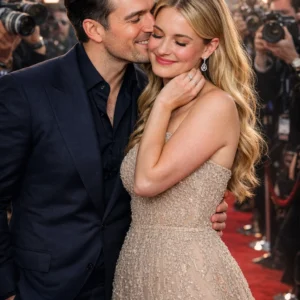In the shadowy underbelly of streaming supremacy, where binge-worthy blockbusters battle for bandwidth supremacy, a quiet giant from across the pond has risen like a phoenix from the ashes of forgotten archives. Accused, the razor-sharp British crime anthology series created by the unflinching maestro Jimmy McGovern, has skyrocketed to the #2 spot worldwide on Netflix charts just days after its understated debut on the platform. Premiering back in 2010 on BBC One and wrapping after two electrifying seasons in 2012, this unassuming gem – now streaming in over 190 countries – has amassed over 45 million viewing hours in its first week, edging out glossy American imports and cozy Korean thrillers alike. What started as a modest six-episode run in its inaugural season, ballooning to eight in the sophomore outing, has transformed into a cultural juggernaut, drawing in a new generation of viewers hooked on its unflinching exploration of guilt, innocence, and the gray morass in between. At the heart of its resurgence? A constellation of British acting royalty – Sean Bean as a tormented cross-dresser, Olivia Colman as a grieving mother teetering on vigilante vengeance, and Stephen Graham as a man ensnared in fraternal fury – whose powerhouse performances remind us why anthology formats can be the sharpest scalpels in television’s surgical kit. As Netflix’s algorithm crowns it queen of the crime genre, Accused isn’t just a rediscovery; it’s a reckoning, proving that the best stories age like fine whiskey: bolder, burn brighter, and leave you questioning every shadow in your own life.
Jimmy McGovern, the Liverpool-born scribe whose resume reads like a rogues’ gallery of social conscience (Cracker, The Street, Time), birthed Accused as a deliberate dagger to the heart of procedural pablum. “We don’t do cops and culprits,” he once quipped in a rare interview, scorning the formulaic fare of CSI clones and Downton dithers. Instead, McGovern flips the courtroom cliché on its ear: Each self-contained episode thrusts us into the defendant’s box alongside a fresh face – ordinary folk thrust into extraordinary peril – flashing back to the fateful fractures that landed them there. No recurring sleuths, no tidy timelines; just raw, retrospective reckonings that peel back the veneer of everyday Britain to expose the festering undercurrents of class, conscience, and catastrophe. Directed by a rotating cadre of talents including David Blair (The Street) and Ashley Pearce (Doctor Who), the series clocks in at taut 60-minute bursts, filmed with gritty realism on Manchester’s cobbled streets and Liverpool’s looming docks. Budgeted modestly at around £2 million per episode, it leaned on location authenticity over lavish effects, letting dialogue do the heavy lifting and actors shoulder the soul-searching. Critically adored upon release – snagging two BAFTA nods and a clutch of RTS awards – Accused faded into the fog of free-to-air TV until Netflix’s algorithmic alchemy resurrected it, bundling both seasons into a bingeable bundle that hit the platform on September 5, 2025. The result? A viral vortex: TikTok theorists dissecting verdicts, Reddit rabbit holes ranking episodes, and watercooler whispers wondering if justice is ever truly blind.
The cast? A veritable Who’s Who of British thespian titans, each episode a star vehicle that accelerates like a getaway car in the night. Sean Bean, the eternal everyman whose on-screen demises have spawned memes and mourning rituals (Game of Thrones, The Lord of the Rings, Patriot Games), anchors Season 2’s standout “Tracie’s Story” with a vulnerability that shatters his stoic shell. As Peter, a mild-mannered English teacher moonlighting as the eponymous Tracie – a cross-dressing alter ego born of buried desires – Bean navigates the episode’s emotional minefield with a tenderness that borders on tragic poetry. His Peter’s double life unravels in a haze of stolen moments and shattering secrets, culminating in a courtroom confrontation that forces viewers to confront their own biases. Bean’s performance is a revelation: Gone is the grizzled warrior; in his place, a man armored in chiffon and quiet desperation, his Yorkshire growl softening to whispers of “Who am I if not this?” It’s the kind of role that cements his chameleon status, earning him a torrent of praise for humanizing the marginalized in a narrative that dances on the knife-edge of comedy and cruelty.
Olivia Colman, the Oscar darling whose eclectic resume spans The Favourite‘s feral fury to The Crown‘s quiet queenship, commands Season 1’s “Helen’s Story” with a ferocity that’s equal parts maternal ferret and forensic fury. As Helen, a widowed schoolteacher whose daughter vanishes into the ether of urban anonymity, Colman channels a slow-simmering rage that erupts like a geyser in the dock. Her Helen’s accusation – kidnapping a suspected predator in a bid for brutal justice – unfolds in flashbacks laced with loss and lacerating love, Colman’s wide eyes welling with a pathos that punches the gut. Known for her unerring ability to blend humor with heartbreak (Fleabag, Broadchurch), Colman here leans into the horror, her voice cracking like thunder over the moors as she recounts the nights of frantic flyers and fruitless pleas. It’s a tour de force that reminds us why she’s a national treasure: Capable of making the monstrous mundane, turning a mother’s madness into a mirror for our own vengeful vicissitudes.
Stephen Graham, the Scouse sensation whose intensity ignites every frame he’s in (This Is England, Boardwalk Empire, Help), ignites Season 2’s “Liam’s Story” with a brotherly blaze that’s as blistering as it is brotherly. As Liam, a devoted sibling accused of vehicular manslaughter in a hit-and-run that claims his own kin, Graham grapples with grief’s grotesque geometry – flashbacks fracturing into fever dreams of fractured family ties. His Liam’s a powder keg of loyalty and lunacy, pounding pub tables in fits of fury while whispering apologies to ghosts in the rearview. Graham’s gift for gritty realism – that raw, regional authenticity honed in McGovern’s own The Virtues – elevates the episode to operatic heights, his accent a weapon wielded with precision, his eyes hollowed by the hollowing horror of “What if I did it for love?” Paired with Bean’s episode-mate in a thematic tango of taboo identities, Graham’s turn underscores Accused‘s thematic thread: The crimes we commit not in malice, but in the misguided mortar of misguided motives.
The ensemble extends far beyond these beacons, a murderers’ row of British brilliance that turns each installment into an acting Olympics. Andy Serkis, the motion-capture maven (Planet of the Apes, The Lord of the Rings), slithers through Season 1’s “Scott’s Story” as a beleaguered businessman accused of embezzlement, his Gollum-esque guile giving way to a Smeagol sorrow that tugs at the heartstrings. Naomie Harris, the Bond bombshell (Skyfall, Moonlight), electrifies “Mo’s Story” in Season 2 with a steely single mother’s saga of benefit fraud born of desperation, her poise cracking into primal pleas that echo the economic eviscerations of austerity Britain. Anna Maxwell Martin (Line of Duty, Mother’s Ruin) brings banshee wails to “Alison’s Story,” a domestic abuser’s descent into denial, while Sheridan Smith (Cilla, Gavin & Stacey) simmers with suppressed sobs in “Sarah’s Story,” a nurse accused of mercy killing in a plot that probes the perils of palliative care. Christopher Eccleston (Doctor Who, Heroes) haunts “Willie’s Story” as a paranoid pensioner pilfering from his progeny, Juliet Stevenson (Truly, Madly, Deeply) lacerates in “Tina’s Story” as a teacher tangled in teen temptation, and Jodie Whittaker (Doctor Who, Broadchurch) blazes through “Jenny’s Story” as a journalist jailed for journalistic jihad. Peter Capaldi (Doctor Who, The Thick of It) snarls in “Frankie’s Story,” Anne-Marie Duff (Suffragette, Vigil) unravels in “Mo’s Story” redux, Robert Sheehan (Misfits, The Umbrella Academy) rages in “Stevie-Jo’s Story,” and Tom Ellis (Lucifer) charms through “Danny’s Story.” Even John Bishop and Marc Warren pop in for punchy cameos, ensuring no episode feels like filler – each a fresh felony forged in fire.
McGovern’s masterstroke lies in the anthology’s architecture: Standalone sagas that spotlight the accused, eschewing the siren songs of serialization for surgical strikes at society’s sores. Season 1’s six chapters chronicle crimes of circumstance – from economic desperation to domestic despair – each opening in the dock’s dread hush, the defendant’s gaze locking with ours as flashbacks flood the frame. “Helen’s Story” kicks off with Colman’s Helen handcuffed and hollow-eyed, regressing to the rainy evenings of her daughter’s disappearance, a narrative that nods to real-world vanishings like Madeleine McCann while wielding the weapon of “What would you do?” “Scott’s Story” follows with Serkis’ suited schemer, his boardroom blunders ballooning into bankruptcy brinkmanship, a cautionary tale of capitalism’s cruel calculus. “Alison’s Story” arcs into abuse’s abyss with Martin’s matriarch, her slaps and sobs a stark spotlight on spousal savagery, while “Tina’s Story” tiptoes through taboo with Stevenson’s seductive snare, probing the perils of power imbalances in pedagogy. “Willie’s Story” wilts with Eccleston’s elder pilferage, a poignant portrait of pensioner penury, and “Stevie-Jo’s Story” surges with Sheehan’s street-smart savagery, a joyride gone jugular.
Season 2 amplifies the anguish, expanding to eight episodes that excavate even deeper fissures. “Liam’s Story” launches with Graham’s gut-wrenching vehicular vortex, his brother’s blood on the bonnet a metaphor for fraternal fractures. “Tracie’s Story” twinkles with Bean’s bifurcated brilliance, blending drag divinity with domestic discord in a episode that earned McGovern co-writing kudos from Shaun Duggan. “Jenny’s Story” journals Whittaker’s journalistic jeopardy, her exposés exploding into entrapment, while “Danny’s Story” dances with Ellis’ dancer’s dilemma – accused of arson after a club conflagration, his terpsichorean twists turning tragic. “Frankie’s Story” fumes with Capaldi’s furious filcher, a father forging funds for his fledgling family, and “Sarah’s Story” simmers with Smith’s syringe of sorrow, mercy’s murky margins laid bare. “Sue’s Story” (Colman’s encore? Whispers suggest a guest glow-up) and “Mo’s Story” (Harris and Duff’s dual dynamite) delve into deception’s depths, from welfare woes to witness woes. Across the board, threads of timeliness tie the tales: Class chasms in austerity’s aftermath, gender gales in a post-#MeToo maelstrom, identity interrogations amid evolving equalities. McGovern’s mise-en-scène is merciless – handheld cams capturing courtroom cacophony, desaturated palettes painting Britain’s bruised beauty – while the verdicts? They’re verdant voids, often ambiguous, leaving juries (and us) to judge the justness.
Yet, it’s the plot twists that transform Accused from anthology also-ran to adrenaline anthology, each episode a sleight-of-hand that subverts expectations like a solicitor’s surprise subpoena. Take “Helen’s Story”: Colman’s vigilante voyage seems a slam-dunk sympathy play – a mother’s manhunt for her missing girl, culminating in a basement bound-and-gagged “perv” – but the mid-episode bombshell detonates when flashbacks reveal Helen’s own hand in her daughter’s “disappearance”: A desperate staging to escape an abusive home, the “kidnapper” her unwitting accomplice in a custody con. The twist isn’t just guilt’s reversal; it’s a gut-punch to our vengeful voyeurism, forcing a reevaluation of “justice” as jury-rigged jury nullification. In “Tracie’s Story,” Bean’s bifurcated bliss curdles when his alter ego’s alibi crumbles: The cross-dressing caper that clears him of the pub brawl? It’s a fabrication forged by his furious wife, who donned the dress in disguise to deliver the blows herself, her “supportive spouse” facade fracturing into furious femininity reclaimed. Graham’s “Liam’s Story” swerves savagely: The hit-and-run that claims his brother? Liam was the wheelman, but not manslaughter – a mercy swerve at his sibling’s suicidal behest, the “accident” a pact sealed in sobs, twisting tragedy into euthanasia ethics. Serkis’ “Scott’s Story” spirals into corporate conspiracy, his embezzlement exposed as a whistleblower’s ploy to topple a toxic tycoon, the “thief” transmuting to tragic hero. Whittaker’s “Jenny’s Story” journals a journalistic jujitsu: Her “entrapment” entrapment? A self-sabotage sting to smoke out sources, the accusation a smokescreen for her own scandalous scoop. These pivots aren’t cheap shocks; they’re philosophical feints, McGovern’s McGuffins that mirror morality’s mess, leaving viewers verdicts-vexed long after the gavel falls.
Accused‘s ascent to Netflix nirvana isn’t mere metric magic; it’s a manifesto for mature storytelling in a snackable era. In the UK, it vaulted from #15 to #1 in 72 hours, propelling global ganders to #2 behind only a Squid Game sequel tease. Stateside, it’s cracked the top 5, with U.S. viewers – weaned on Law & Order – raving about its restraint: “No ads, no autopsies – just humans howling in the hurt,” tweets one viral reviewer. The platform’s push – a subtle thumbnail tweak featuring Colman’s tear-streaked mug – has minted McGovern a millennial mentor, his disdain for “drama that doesn’t matter” resonating in a post-pandemic pall. Merch? Modest but mighty: Tote bags emblazoned with “Innocent Until Proven Binge-Worthy” flying off Etsy shelves. Critics chorus acclaim: The Guardian dubs it “a dockside Black Mirror with heart,” Variety hails the “ensemble éclat,” and Rotten Tomatoes’ 92% fresh festoon underscores its staying power.
As Accused accuses the airwaves of complacency, its stars stand sentinel. Bean, Colman, Graham – these aren’t guest spots; they’re gut-wrenching gut checks, their luminaries lighting the labyrinth of law’s limits. In a TV tapestry torn by true-crime tedium, McGovern’s mosaic gleams: Proof that the accused aren’t always antagonists, and verdicts? They’re ours to voice. Stream it, savor it, and sleep uneasy – because in Accused, justice isn’t served; it’s savored, sour, and supremely unsettling. The jury’s out, but the binge is in.





